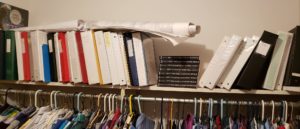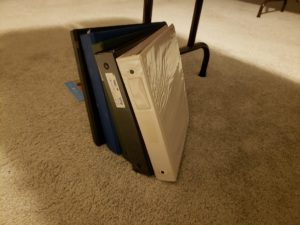
I’ve written before about various special projects I’ve undertaken in the last two years of so. The sale of my 1900 encyclopedia set. The donation of the Stars and Stripes. The transfer of my grandfather’s trunk to a cousin. A collection of letters between a friend and me. The church Centennial book. A special project of some sort always seems to be in the mix of normal work.
Some of those special projects relate to disaccumulation in anticipation of a future downsizing. No date is set, but we know it’s coming. A couple of years ago I looked at the shelf of genealogy notebooks on a shelf in my closet and knew I had to do something about them.
I seriously doubt that my family members will be interested in it. Never say never, of course. I wasn’t interested in my genealogy until I was 46. So children or grandchildren might still show some interest. But as of now, none. When I’m gone, what’s going to happen to them? The trash can, I imagine. I really don’t want to leave them to my heirs to have to clean up, and I doubt I would have room for them in a smaller place.

I thought of donating them to some research library. But there are two problems with that. First, since I have been researching all family lines, both mine and my wife’s, and since we grew up in very different places and circumstances, the files would have to be split in two or more places.
But the really big reason why I can’t simply donate them is that they are atrociously unfinished. I started many sheets on many ancestors and never finished them. My documentation of facts I’ve accumulated ranges from excessive to non-existent. I would have to put a lot of work into bringing my files to a much higher level of completion than they are now before I could even think about donating them.
So I went through the notebooks, one by one, to see what I could cull from each. Page by page, I made a keep-discard decision. Some were easy but many were not. I got rid of enough pages to eliminate maybe a notebook or two, maybe even three.
Finally, early this year, I decided what I needed to do was digitize my files and throw most of the papers away. That, at first, proved to be a difficult process. How should I file them, and where? Do I file by family name first and generation second, or generation first and family second? I had already put in place a system for filing genealogy papers, which included a way of numbering ancestors.
But I found the system I started using wasn’t working. The system I needed had to be “retrievable”—that is, if I ever get back to active genealogy research I need to be able to find on the computer the files I digitized. That took some thinking and trials, but I finally got it. I would number each person first by their Ahnentafel number. I won’t explain that. It’s easily findable if you’re interested. Then I would include their generation number. My method for numbering generations is to designate my children to be Generation 100, and count backwards and forwards from there. I’m generation 99, my parents are generation 98, etc.
I decided to save everything to Microsoft OneDrive. If that ever goes away, or if they have a data failure, I could lose everything. That’s a risk I’m willing to take so as to reduce the amount of paper I have.
I began this project in earnest sometime earlier this year. Working notebook by notebook, page by page, I look at each page to see, with a more critical eye than I did before, if it’s a sheet that I want to keep, or if it’s so unfinished or preliminary or far in antiquity that it’s better just to discard it. My goal is to discard 10 sheets a day, either by scanning and discard or by immediate discard.
Ten sheets a day doesn’t sound like much, but over a year that would be 3,650 sheets if I did this every day. That’s over seven reams of paper in a year. That will put a serious dent in that shelf of notebooks in the closet. And while 10 sheets is the goal, my unofficial goal is 20 sheets. that would be approaching 15 reams of paper.
It’s actually kind of burdensome. Making the keep-discard decision, doing the scanning, figuring out the right place to save the scanned file and the right name to give it. After ten pages, I’m somewhat brain weary. Maybe that doesn’t make sense, since “getting things done” normally energizes me. I do feel energized when I work on the project, but it also wearies me.
I’d say I’m averaging 15 pages a day, discarded directly or after scanning and e-filing. That may not be fast enough to do what I want to do, but it’s the best I can do unless I stop all other things that make life interesting.
I’ll check back in and report more about this project in another month. Maybe I’ll have reduced my paper files by another couple of notebooks.